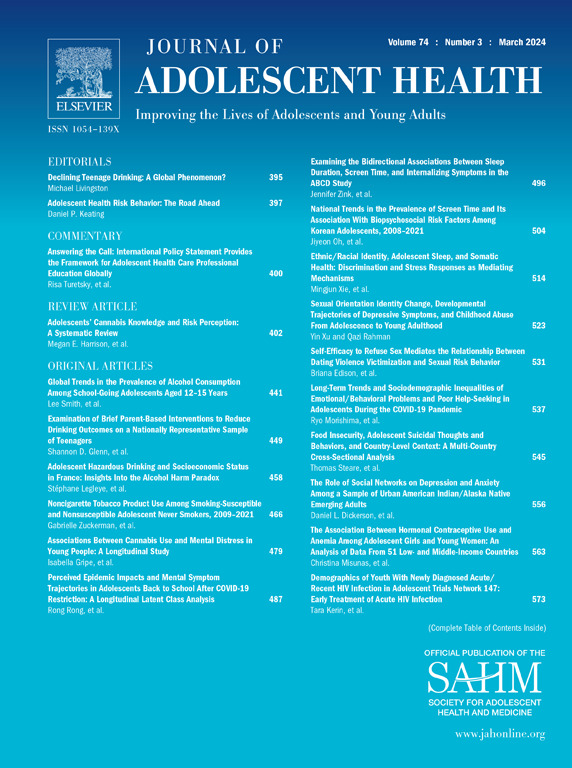Adolescent Mental Health and School Belonging in KwaZulu-Natal, South Africa: Impact of the COVID-19 Pandemic and Subsequent Government Lockdowns
IF 5.5
2区 医学
Q1 PEDIATRICS
引用次数: 0
Abstract
Purpose
We hypothesized that extended exposure to the COVID-19 pandemic and government lockdown was associated with increased depression and anxiety symptoms among South African adolescents and a sense of school belonging mediated these relationships. We also hypothesized that poor mental health or school belonging impacted alcohol consumption.
Methods
Embedded in the Asenze Cohort Study, data were collected from adolescents between 2019 and 2021. The Patient Health Questionnaire, General Anxiety Disorder questionnaire and Psychological Sense of School Membership scale were used to measure depression, anxiety, and school belonging, respectively. Alcohol consumption was a cumulative score of the total number of days alcohol was consumed in the previous 30 days. Lockdown exposure was the number of months participants were exposed to lockdown conditions. Structural equation modeling was used to assess the relationship between the outcome variables.
Results
Among 866 adolescents included in the analysis, approximately 20% met the symptom criteria for moderate or severe depression or anxiety. The mean school belonging score was high (23; SD = 5.79) and alcohol consumption low. Lockdown exposure was not directly or indirectly associated with depression or anxiety symptoms. A greater sense of school belonging reduced both depression and anxiety symptoms.
Discussion
This study contradicts previous studies and suggests that lockdown was not associated with poor mental health in this cohort of adolescents. School belonging was high despite school closures and associated with lower depression and anxiety. Research around school belonging and how it can be promoted to better support isolated students is recommended.
南非夸祖鲁-纳塔尔省青少年心理健康和学校归属感:COVID-19大流行和随后的政府封锁的影响
目的:我们假设,长期暴露于COVID-19大流行和政府封锁与南非青少年抑郁和焦虑症状增加有关,而学校归属感介导了这些关系。我们还假设心理健康状况不佳或学校归属感会影响饮酒。方法:在Asenze队列研究中,收集了2019年至2021年青少年的数据。采用《患者健康问卷》、《一般焦虑障碍问卷》和《学校成员心理感量表》分别测量抑郁、焦虑和学校归属感。饮酒量是过去30天内饮酒总天数的累积分数。锁定暴露是指参与者暴露在锁定条件下的月数。采用结构方程模型评估结果变量之间的关系。结果:在纳入分析的866名青少年中,约20%符合中度或重度抑郁或焦虑的症状标准。学校归属平均分较高(23分;SD = 5.79),酒精摄入量低。禁闭暴露与抑郁或焦虑症状没有直接或间接联系。更强烈的学校归属感减少了抑郁和焦虑症状。讨论:这项研究与之前的研究相矛盾,表明在这群青少年中,禁闭与心理健康状况不佳无关。尽管学校关闭,但学校归属感很高,与较低的抑郁和焦虑有关。建议围绕学校归属感进行研究,以及如何促进学校归属感以更好地支持孤立的学生。
本文章由计算机程序翻译,如有差异,请以英文原文为准。
求助全文
约1分钟内获得全文
求助全文
来源期刊

Journal of Adolescent Health
医学-公共卫生、环境卫生与职业卫生
CiteScore
10.40
自引率
3.90%
发文量
526
审稿时长
46 days
期刊介绍:
The Journal of Adolescent Health is a scientific publication dedicated to enhancing the health and well-being of adolescents and young adults. Our Journal covers a broad range of research topics, spanning from the basic biological and behavioral sciences to public health and policy. We welcome a variety of contributions, including original research papers, concise reports, literature reviews, clinical case reports, opinion pieces, and letters to the editor. We encourage professionals from diverse disciplines such as Anthropology, Education, Ethics, Global Health, Health Services Research, Law, Medicine, Mental and Behavioral Health, Nursing, Nutrition, Psychology, Public Health and Policy, Social Work, Sociology, and Youth Development to share their expertise and contribute to our mission of promoting adolescent health. Moreover, we value the voices of young individuals, family and community members, and healthcare professionals, and encourage them to submit poetry, personal narratives, images, and other creative works that provide unique insights into the experiences of adolescents and young adults. By combining scientific peer-reviewed research with creative expressions, our Journal aims to create a comprehensive understanding of the challenges and opportunities in adolescent and young adult health.
 求助内容:
求助内容: 应助结果提醒方式:
应助结果提醒方式:


